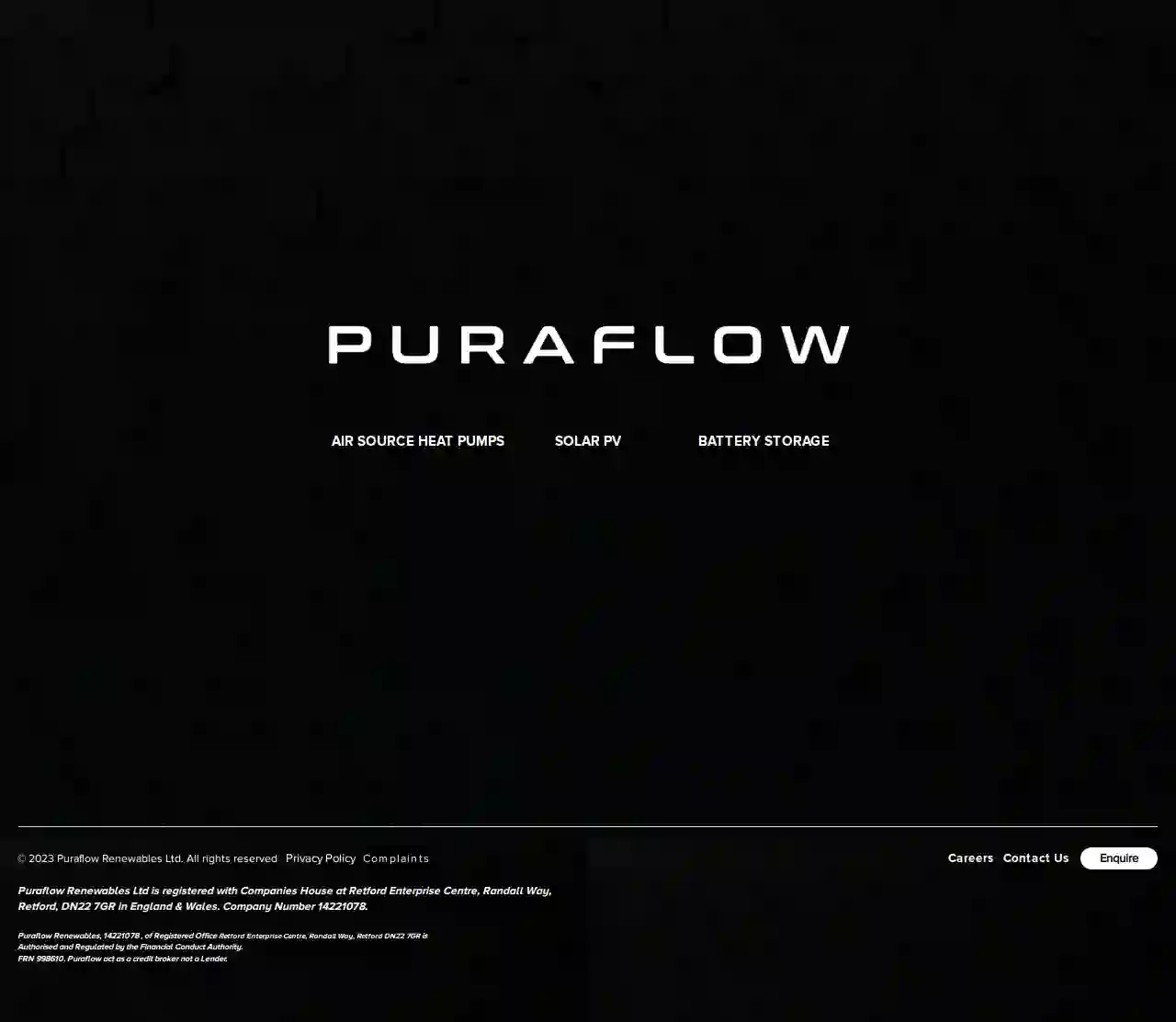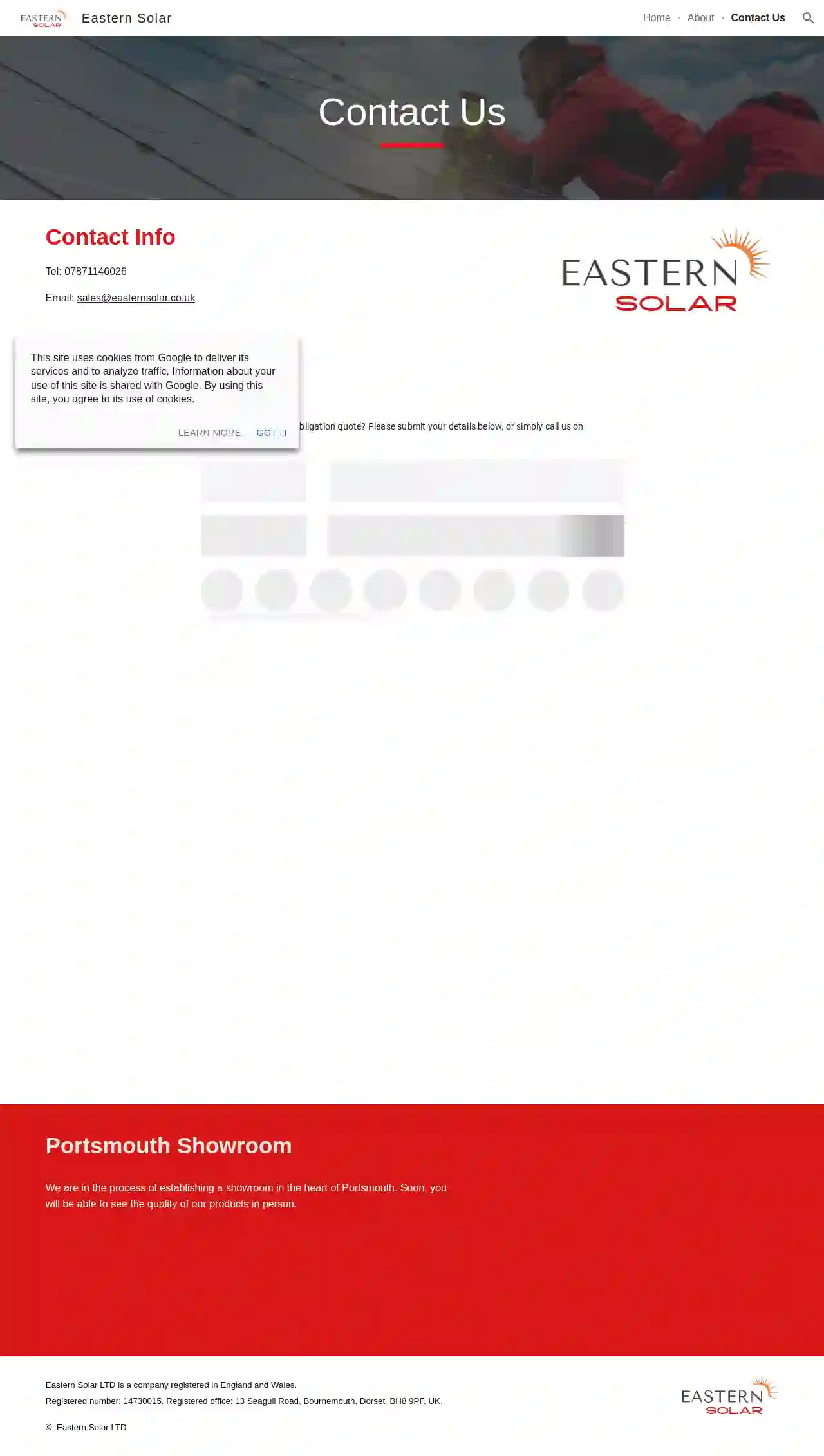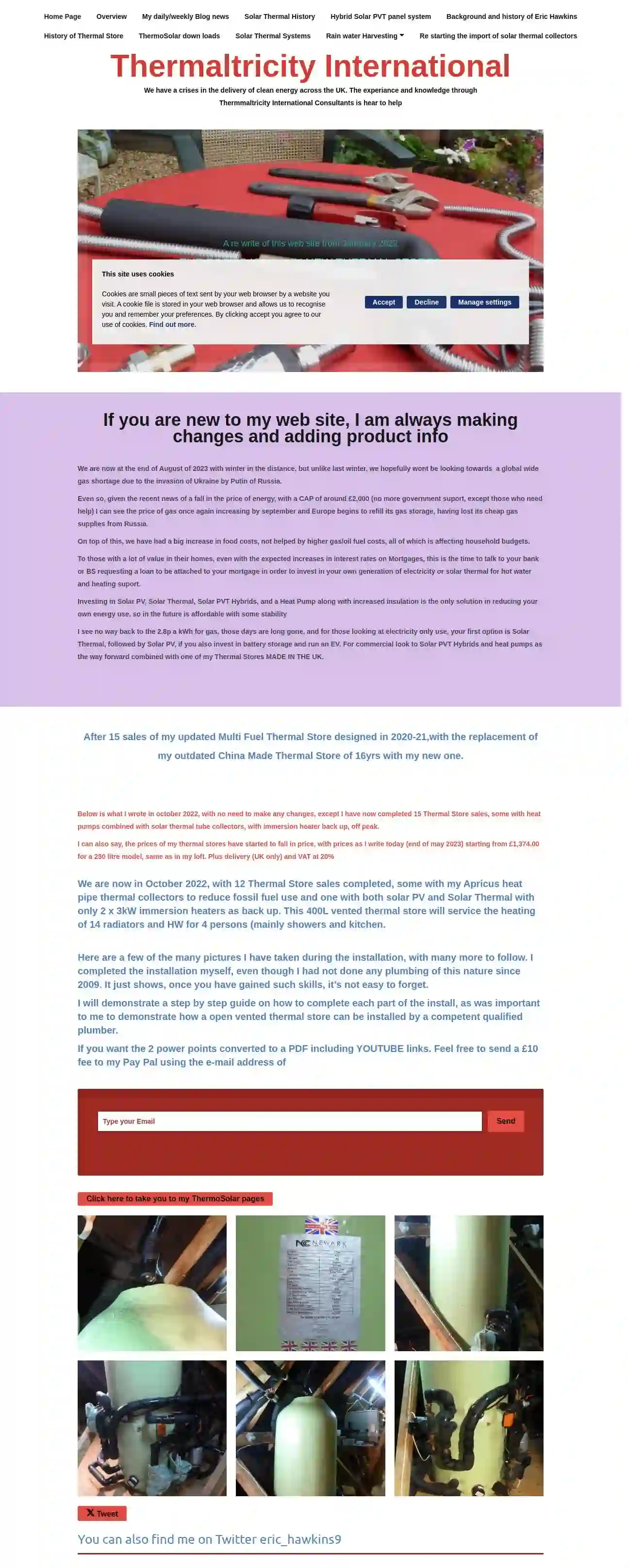Solar Installers Ruskington
Top Solar Energy Company in Ruskington
Receive up to 3 Solar Installer quotes for your project today! Compare profiles, reviews, accreditations, portfolio, etc... and choose the best deal.

Puraflow Renewables
51 reviewsRetford Enterprise Centre, Randall Way, Retford, DN22 7GR, GBPuraflow Renewables Ltd is a leading provider of renewable energy solutions, helping homeowners and businesses reduce their carbon footprint and save money on energy bills. We offer a wide range of products and services, including air source heat pumps, solar PV, battery storage, and smart energy tariffs. Our team of expert engineers and advisors are dedicated to providing our clients with the best possible solutions for their individual needs. We are committed to delivering high-quality products and services, backed by exceptional customer service. Puraflow Renewables Ltd is registered with Companies House at Retford Enterprise Centre, Randall Way, Retford, DN22 7GR in England & Wales. Company Number 14221078. Puraflow Renewables Ltd is authorised and regulated by the Financial Conduct Authority FRN 998610. We act as a credit broker not a lender and offer finance from a panel of lenders. We are passionate about creating a sustainable future and believe that renewable energy is the key to achieving this goal. We are committed to providing our clients with the knowledge and support they need to make informed decisions about their energy needs. Contact us today to learn more about how Puraflow Renewables can help you save money and reduce your carbon footprint.
- Services
- Why Us?
- Gallery
Get Quote
Eastern Solar
13 Seagull Road, Bournemouth, BH8 9PF, GBEastern Solar is a renewable installation company based in Dorset. We provide tailored solar installations across Dorset, Hampshire, Wiltshire, Berkshire, Somerset, Surry, West Sussex and London. With over 15 years of electrical experience, we aim to bring a greener future to your home with industry-leading technology. We only use the best parts for our system. All our solar panels are Tier 1 monocrystalline panels certified by MCS. They come with a minimum of 25 years of manufacturer's warranty to give you peace of mind.
- Services
- Why Us?
- Accreditations
- Gallery
Get Quote
Solar Thermal Repairs
Bourne, GBSolar Thermal Repairs is a company that specializes in solar panel repairs, solar thermal repair, hot water repairs, and solar overheating. They also offer moving solar panels and EV charger installation services. With over 15 years of experience, they are fully accredited and insured. Contact them at 03330164288 or email at [email protected].
- Services
- Why Us?
- Gallery
Get Quote
Thermaltricity International
London, UK, 123 Main Street, SW1A 1AA, GBThermaltricity International is a company that specializes in providing thermal stores and solar thermal systems for homes and businesses. The company's founder, Eric Hawkins, has been in the industry for over 15 years and has developed a range of products that are designed to reduce energy consumption and carbon emissions. The company's thermal stores are designed to be efficient and reliable, and can be used in conjunction with solar thermal systems to provide hot water and heating. The company also offers a range of other products and services, including solar PV systems, heat pumps, and insulation solutions. The company's mission is to provide high-quality products and services that help customers reduce their energy consumption and carbon footprint.
- Services
- Why Us?
- Accreditations
- Our Team
- Testimonials
- Gallery
Get Quote
TheGreenHomeCo.
511 reviewsBourne, GBTheGreenHomeCo is a leading provider of solar panel and EV charger solutions. We are dedicated to helping our customers make the switch to renewable energy, providing them with the highest quality products and services available. Our team of experts is knowledgeable and passionate about the benefits of solar energy, and we work closely with each of our customers to determine the best solutions for their specific needs. Reach Out to Our Local Support Team Today. Say Goodbye to High Energy Bills with TheGreenHomeCo's Solar Solutions. The cost of traditional energy sources continues to rise, putting a strain on household and business budgets. But what if you could reduce your energy bills and take control of your energy consumption? With TheGreenHomeCo, you can. Our team of experts is dedicated to providing top-notch solar solutions that can help you save money on your monthly energy bills. By harnessing the power of the sun, our solar panels and EV chargers provide a consistent and efficient source of energy, reducing your dependence on traditional energy sources. Reach Out to Our Local Support Team Today. YOUR PARTNER IN THE SWITCH TO SOLAR.
- Services
- Why Us?
- Gallery
Get Quote
Green Wing Energy Saving Solutions
Bournemouth, England, United Kingdom, 149 Capstone Road, BH8 8RZ, GBGreen Wing Energy Solutions burst onto the scene in August 2009 and since then the company have helped many home and business owners benefit from an array of proven energy saving solutions. After 13 years of supporting clients, we boast over 25 different energy and water saving solutions to help customers significantly reduce energy consumption, carbon and costs! We understand that not every client has the same needs, so offering an array of proven solutions helps us to tailor our support. Jon Cullum, Managing Director of Green Wing Energy Solutions, works closely and directly with clients to ensure fit for purpose solutions are recommended and the benefits are delivered to meet customer expectations. We care about our clients and the results we deliver, so our team of electrical and heating engineers are fully qualified, with up to date certifications and approval from recognised electrical and heating bodies.
- Services
- Why Us?
- Our Team
- Gallery
Get Quote
Get Solar PV
36 High Street, Cleethorpes, DN35 8JN, GBGet Solar PV is a company that helps homeowners and businesses switch to solar energy. We provide a free quote service that connects customers with trusted solar panel installers. Our installers are fully accredited and insured, and we offer a range of services including solar PV, solar batteries, and solar thermal systems. We also provide flexible payment plans and finance facilities to make it easy for customers to get started. With Get Solar PV, you can reduce your energy bills by up to 80% and even sell excess energy back to the grid. We are a responsible agent and ensure that all our installers are fully compliant with UK legislation and best practice industry procedures. We are also keen on the environment and provide a range of benefits to our customers, including a lifetime warranty and industry-leading warranty protection.
- Services
- Why Us?
- Accreditations
- Our Team
- Testimonials
- Gallery
Get Quote
Eagle Electrical (Lincs) Ltd
55 reviewsBlackwood Court, Teal Park, Unit 17 Blackwood Court, Lincoln, LN6 3AE, GBEagle Electrical, your one-stop solution for solar PV and battery storage systems. As a leading solar energy company, we are passionate about harnessing the power of the sun to provide clean, renewable, and cost-effective energy to homes and businesses across the country. Our Mission At Eagle Electrical, our mission is to accelerate the global transition to sustainable energy by providing our customers with innovative and reliable solar PV and battery storage solutions. We aim to empower individuals and organizations to achieve energy independence, reduce carbon emissions, and save on electricity costs. Our History Established in 2007, Eagle Electrical has grown rapidly to become a trusted name in the solar energy industry. Our founder, Guy Lower, a highly experienced electrical engineer, envisioned a future where clean and sustainable energy would be accessible to all. With a team of skilled professionals, we have successfully completed hundreds of solar installations across the Lincolnshire region, helping our customers reduce their energy bills and minimise their carbon footprint.Why Choose Eagle Electrical? Expertise: Our team of certified and experienced solar installers ensures that every project we undertake is executed to the highest standards. We stay up-to-date with the latest industry trends and advancements to offer the best solar solutions to our clients. Quality Products: We partner with the most reputable manufacturers in the solar industry to provide our customers with top-quality solar panels, inverters, and battery storage systems that ensure optimal performance and longevity. Customised Solutions: At Eagle Electrical, we understand that every customer has unique energy needs. Our team conducts a thorough assessment of your energy consumption patterns and requirements to design a solar PV and battery storage solution tailored specifically to your needs. Seamless Process: We pride ourselves on our hassle-free, end-to-end service. From initial consultation and site assessment to system design, installation, and ongoing maintenance, our team ensures a smooth and worry-free experience for our clients. Competitive Pricing: As a customer-centric company, we are committed to providing affordable solar energy solutions without compromising on quality. We offer flexible financing options and support our clients in securing federal and state incentives to make solar energy a viable option for everyone. Excellent Customer Support: Our dedicated customer support team is always available to answer your questions, address any concerns, and
- Services
- Why Us?
- Accreditations
- Our Team
- Testimonials
- Gallery
Get Quote
Pure Renewables
412 reviewsBoston, GBPure Renewables is a company dedicated to providing bespoke renewable energy solutions for residential and commercial clients. They prioritize quality and are a TrustMark UK Government-Endorsed Quality Scheme member. Their services include solar panels, heat pumps, heat recovery systems, and underfloor heating.
- Services
- Why Us?
- Accreditations
- Gallery
Get Quote
HDM Solar (Head Office)
4.428 reviews40, Kingfisher Way, Dinnington, S25 3AF, GBFree GivEnergy EV charger When you buy GivEnergy All-in-One Battery System or any 9.5kWh battery THE Wholesaler of Renewable Energy Products Next Day UK Delivery or Same Day Pick Up Solar Products Solar Panels All Solar Panels All-Black Solar Panels Black-Framed Solar Panels Silver-Framed Solar Panels Power Inverters All Inverters Hybrid Inverters String Inverters AC-Coupled Inverters All-in-One Inverters Battery Storage All Batteries Low-Voltage Batteries High-Voltage Batteries DC-Coupled Batteries Battery + Inverter Kits Battery Accessories Electric Vehicle Chargers All EV Chargers Commercial Chargers Domestic Chargers Portable Solar Products Portable Solar Panels MPPT Charge Controllers Portable Inverters Portable Batteries Accessories Cables and Accessories All Cables and Accessories Cables Meters Isolators Solar Accessories Electrical Accessories Mountings All Mountings On-Roof Tile Mountings In-Roof Tile Mountings Flat-Roof Mountings Metal-Roof Mountings Ground Mountings Accessories and Bird Protection All Products Special Offers View All Products Help & Advice Help & Advice Solar PV Design Meet the Team Installer Locator News Contact Trade Careers Call us: 0800 0016 802
- Services
- Why Us?
- Gallery
Get Quote
Over 3,485+ Solar Businesses on our platform
Our solar pros operate in Ruskington and beyond!
SolarCompaniesHub has curated and vetted the Best Solar Companies in and around Ruskington. Find a trustworthy pro today.
Frequently Asked Questions About Solar Installers
- Cash Purchase: The most straightforward option, providing the greatest long-term savings but requiring a larger upfront investment.
- Solar Loans: Loans specifically designed for solar installations, often with favorable terms and interest rates.
- Solar Leases: A third-party company owns the system and leases it to you, allowing you to go solar with little or no upfront cost, but you won't own the system or receive tax benefits.
- Power Purchase Agreements (PPAs): Similar to leases, but you pay for the electricity generated by the system, not the system itself.
- Home Equity Loans or Lines of Credit: Borrow against the equity in your home.
What happens if my roof needs to be replaced after I install solar panels?
Will solar panels work during cloudy days or at night?
How do solar panels work?
How can I finance my solar panel installation?
What happens if my roof needs to be replaced after I install solar panels?
Will solar panels work during cloudy days or at night?
How do solar panels work?
How can I finance my solar panel installation?
- Cash Purchase: The most straightforward option, providing the greatest long-term savings but requiring a larger upfront investment.
- Solar Loans: Loans specifically designed for solar installations, often with favorable terms and interest rates.
- Solar Leases: A third-party company owns the system and leases it to you, allowing you to go solar with little or no upfront cost, but you won't own the system or receive tax benefits.
- Power Purchase Agreements (PPAs): Similar to leases, but you pay for the electricity generated by the system, not the system itself.
- Home Equity Loans or Lines of Credit: Borrow against the equity in your home.